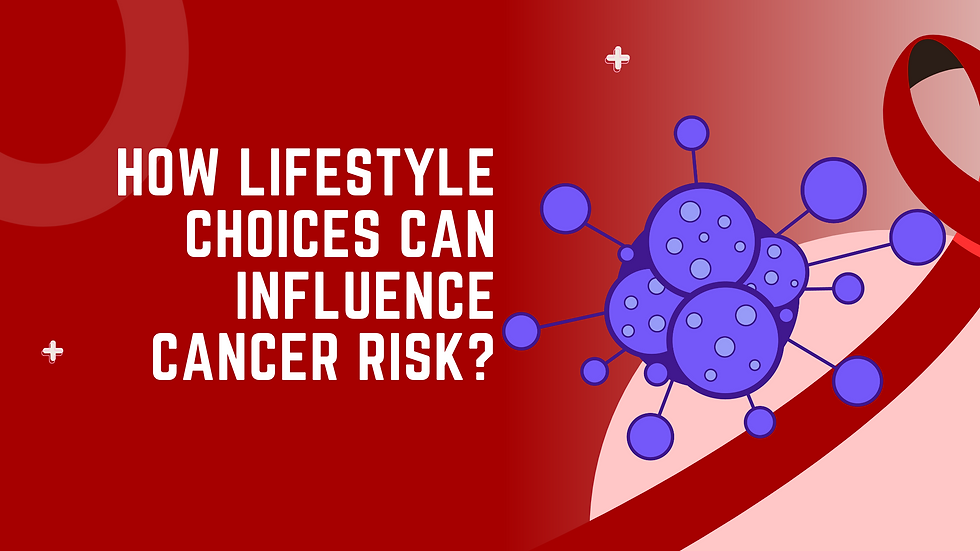How Lifestyle Choices Can Influence Cancer Risk?
- Dr H K Barman

- Jul 5, 2025
- 4 min read

Cancer is one of the leading causes of death worldwide, and while certain risk factors like genetics and age are beyond our control, a growing body of evidence suggests that lifestyle choices play a significant role in determining our cancer risk.
From what we eat to how we move, sleep, and manage stress, daily habits can either protect us or put us at risk.
As a cancer specialist and ENT Specialist based in Guwahati, Dr. Himajit Kumar Barman has seen firsthand how preventable factors often influence a patient’s health outcomes. In this article, we break down the key lifestyle factors that contribute to cancer risk and how making informed decisions today can lead to a healthier tomorrow.
1. Tobacco Use: The Single Largest Preventable Cause of Cancer
Tobacco consumption, whether in the form of smoking or chewing, is the leading cause of preventable cancer-related deaths. It is strongly linked to cancers of the lung, oral cavity, throat, esophagus, and more. According to the World Health Organization, tobacco is responsible for approximately 22% of all cancer deaths.
What You Can Do:
Avoid all forms of tobacco.
Seek support through counseling or smoking cessation programs.
Avoid exposure to secondhand smoke, which also poses a cancer risk.
Local Insight: In Assam and the Northeast, where smokeless tobacco use is relatively high, public awareness and early oral cancer screenings are especially crucial.
2. Unhealthy Diet: You Are What You Eat
A diet high in processed meats, red meats, sugar, and refined carbohydrates can increase the risk of cancers such as colorectal, pancreatic, and stomach cancer. On the other hand, diets rich in vegetables, fruits, whole grains, and legumes offer protective benefits.
What You Can Do:
Eat a colorful plate: incorporate seasonal fruits and vegetables.
Limit red and processed meat intake.
Choose whole grains over refined grains.
Cut back on sugary beverages and processed snacks.
Expert Tip: Traditional Indian diets can be cancer-protective when focused on lentils, greens, turmeric, and fresh produce.
3. Lack of Physical Activity and Obesity
Being overweight or obese is associated with an increased risk of various cancers, including breast (postmenopausal), colorectal, endometrial, and kidney cancers. Physical activity helps regulate hormones, improves immune function, and aids in maintaining a healthy weight.
What You Can Do:
Aim for at least 150 minutes of moderate aerobic activity or 75 minutes of vigorous activity per week.
Incorporate daily movement: walking, cycling, dancing, yoga.
Limit screen time and sedentary behaviors.
Note from Dr. Barman: "You don’t need a gym membership to stay active. Small lifestyle changes, like taking the stairs or evening walks, make a difference."
4. Alcohol Consumption
Alcohol is a known carcinogen and has been linked to an increased risk of cancers of the mouth, throat, liver, breast, and colon. The risk increases with the amount of alcohol consumed over time.
What You Can Do:
Limit or avoid alcohol intake.
Be mindful of serving sizes and frequency.
Consider alcohol-free days each week.
Even moderate drinking poses some risk, and combining alcohol with tobacco multiplies the damage to cells, particularly in the oral and throat regions.
5. Poor Sleep and Chronic Stress
Sleep deprivation and unmanaged chronic stress weaken the immune system and can lead to hormonal imbalances, which may affect cancer risk over time. Chronic stress can also encourage unhealthy coping habits like overeating, smoking, or drinking.
What You Can Do:
Prioritize 7–8 hours of quality sleep each night.
Develop healthy stress management practices: meditation, deep breathing, journaling.
Maintain social connections and seek mental health support when needed.
Mind-Body Connection: Evidence suggests that emotional health is intricately linked with physical well-being, especially during cancer recovery.
6. Unsafe Sexual Practices and HPV Infection
The Human Papillomavirus (HPV) is a leading cause of cervical cancer and is also associated with cancers of the head and neck. HPV spreads through sexual contact and is often preventable through vaccination and safe sexual practices.
What You Can Do:
Get vaccinated for HPV, ideally in adolescence.
Use protection during sexual activity.
Get regular screenings for cervical and oral cancers.
ENT Relevance: As an ENT specialist, Dr. Barman frequently deals with HPV-related head and neck cancers, stressing the importance of early detection.
7. Environmental & Occupational Exposures
Prolonged exposure to pollutants, pesticides, industrial chemicals, and even excessive sunlight (UV radiation) can increase cancer risk. In many urban and semi-urban settings, people may be unaware of the risks in their environment.
What You Can Do:
Use protective gear when working with chemicals.
Limit direct sun exposure; use sunscreen and protective clothing.
Ensure proper ventilation and air quality in living and working spaces.
Local Context: Urban pollution and the use of biomass fuels in rural Assam can pose serious respiratory and cancer risks.
Final Thoughts: Prevention Begins with Awareness
Cancer is not always preventable, but making informed lifestyle choices can significantly reduce your risk. The decisions you make today about what you eat, how you move, and how you care for your mental and physical well-being can shape your future health.
Dr. Himajit Kumar Barman and his team in Guwahati are committed to not only providing advanced cancer and ENT treatment but also empowering individuals to live healthier, cancer-aware lives.
If you or a loved one is concerned about symptoms or risk factors, early consultation and screening can make all the difference.
For expert consultation in oncology and ENT care, visit www.drhkbarman.com/contact-us or call +91 8134927748.
_edited.png)
.png)


Comments